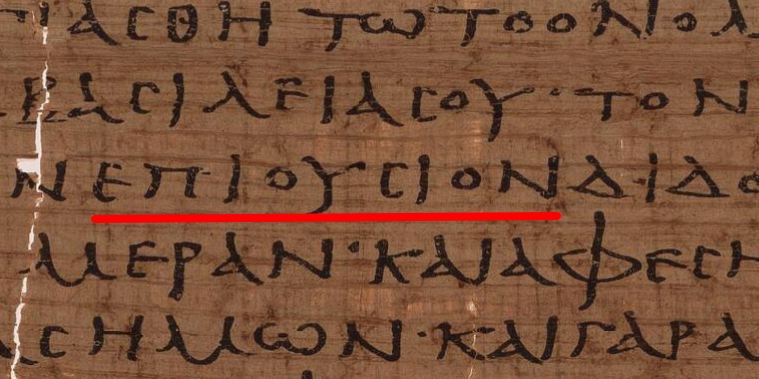the full line being “Give us today our epiousion bread”
Today, most scholars reject the translation of epiousion as meaning daily. The word daily only has a weak connection to any proposed etymologies for epiousion. Moreover, all other instances of “daily” in the English New Testament translate hemera (ἡμέρα, “day”), which does not appear in this usage.[1][2] Because there are several other Greek words based on hemera that mean daily, no reason is apparent to use such an obscure word as epiousion.[4] The daily translation also makes the term redundant, with “this day” already making clear the bread is for the current day.[21]
i don’t think wikipedia mentions this but it has ‘pious’ in the middle



Scribes generally do a good job of checking that they didn’t make an error in transcription . It like likely that what we have is what was written down around ad40-ad90. (Years approximate). Things were written mostly by eyewitness or those who interviewed eye witnesses. The whole reads like it.
Of course things were translated to Greek, it is unlikely that the words were spoken in that language.
The scholarly consensus is that this is not the case. The earliest written Gospel (Mark) couldn’t have been written any earlier than the occupation of the Temple during the First Jewish Revolt in 66-67, and all indications are that he was writing down traditions that came from his community and others, with no immediate connection to any “eyewitnesses.”
(Source: I have a PhD in this stuff.)
If I remember right, the reason why Mark has scholarly consensus as being written before John is that Mark is least theologically developed, which only really makes sense as evidence for that if you’re starting from the position that the theological bits are later additions. I remember Q and M as evidence for Mark before Matthew or Luke, but is there any evidence that Mark was written before John that doesn’t start with the position that more-developed theology is a later addition?
Why am I being downvoted for asking someone with a PhD in this topic a question about their expertise?
I’m not the person you were responding to, but found your question interesting.
I re-read most of the Wikipedia article on Markan Priority. Imo These parts of the article sum up the argument nicely.
…
…
Ooooooh - what’s your opinion on the Secret Gospel of Mark? I’m an ex-xtian that copes with the indignity of being indoctrinated into fundamentalism at a young age by devoting way too much of my time into secular lay research into varieties of early Christianity.
PhD in what? Tell me about your opinion on the secret gospel. Not a trap. Just love this shit.
Dr. Dan?
Literally every statement in your comment is false. Read a fucking book that isn’t the bible.
Flavius Josephus?